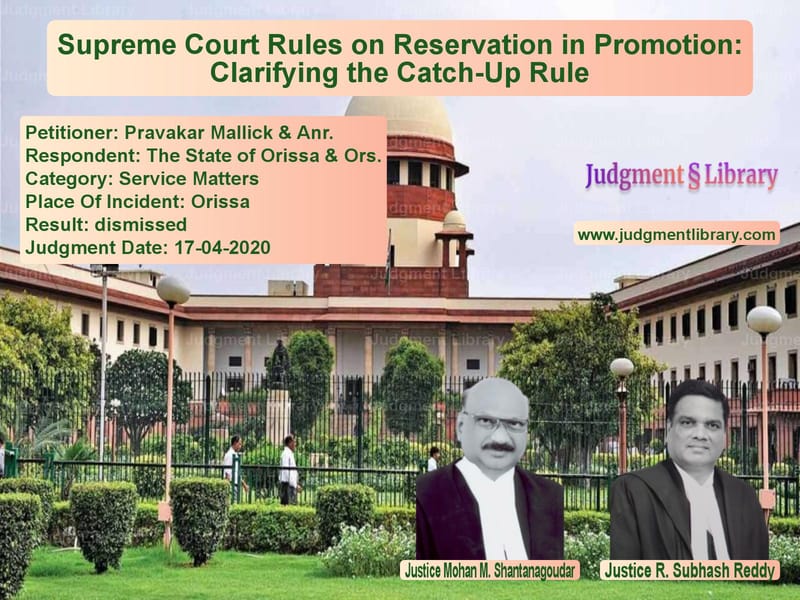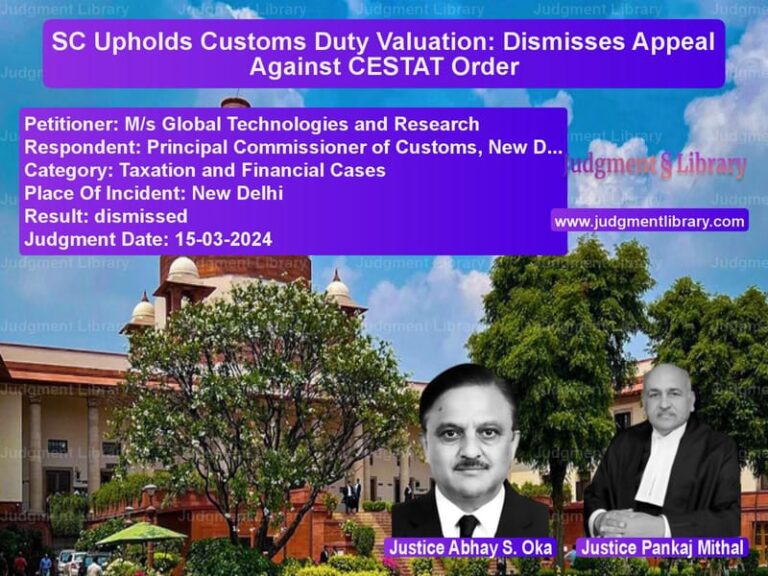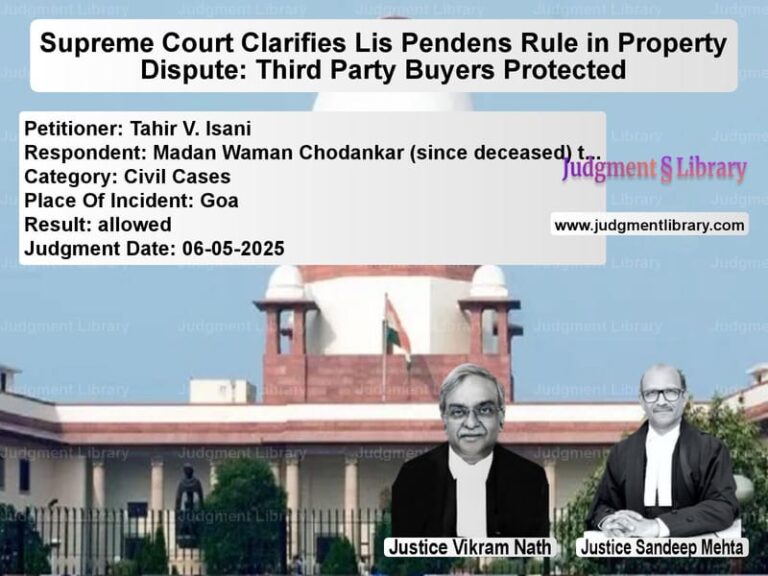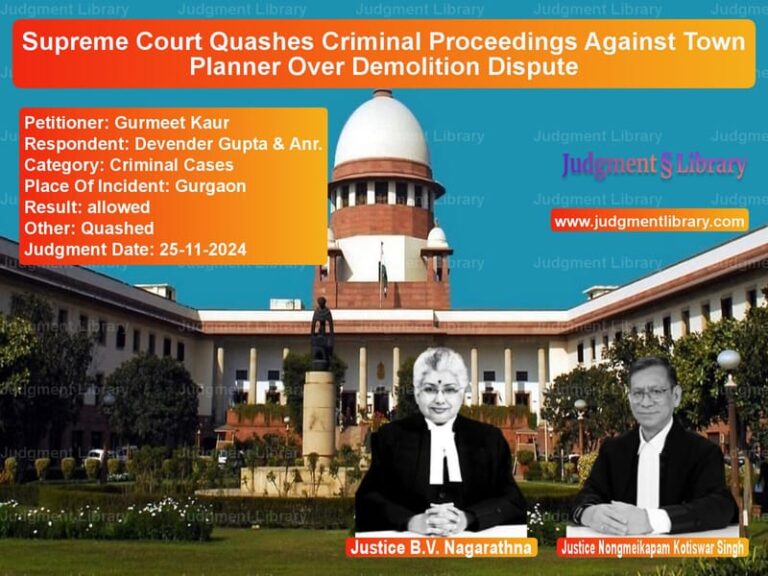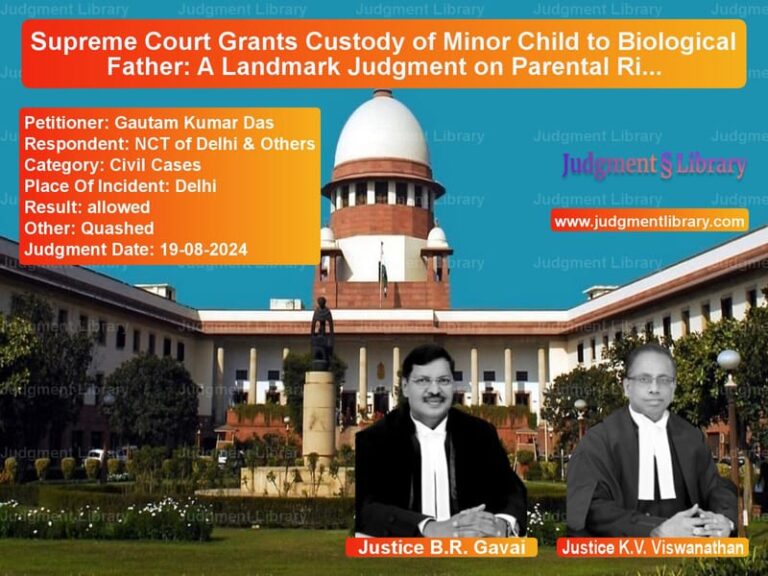Supreme Court Rules on Reservation in Promotion: Clarifying the Catch-Up Rule
The Supreme Court of India, in a landmark ruling in Pravakar Mallick & Anr. vs. The State of Orissa & Ors., clarified the application of reservation in promotions and the catch-up rule for general category employees. The case involved the seniority of Scheduled Caste (SC) and Scheduled Tribe (ST) employees who had been promoted under reservation policies and whether they could claim consequential seniority over general category candidates.
Background of the Case
The appellants, general category officers, challenged the Government Resolution dated 20.03.2002, which gave consequential seniority to SC/ST officers promoted through reservation. The High Court of Orissa ruled in favor of the general category officers, quashing the resolution and a subsequent Gradation List dated 03.03.2008, which had altered seniority rankings. The state government appealed against this decision before the Supreme Court.
Key Legal Issues Raised
- Did the state government have the authority to grant consequential seniority to SC/ST employees promoted under reservation?
- Was the Government Resolution dated 20.03.2002 legally valid?
- Could the state government alter seniority lists without enacting a law in compliance with Article 16(4A)?
- Did the catch-up rule apply to general category employees promoted after SC/ST officers?
Arguments by the Appellants (General Category Officers)
The appellants contended:
- The Government Resolution dated 20.03.2002 violated constitutional provisions as it granted consequential seniority to SC/ST employees without enacting a supporting law.
- The Supreme Court, in Virpal Singh Chauhan vs. Union of India and Ajit Singh (II) vs. State of Punjab, had upheld the catch-up rule, ensuring that once a general category officer was promoted, they would regain seniority over earlier-promoted SC/ST candidates.
- The High Court correctly ruled that the resolution had no legal basis under Article 16(4A), which requires quantifiable data to justify reservation in promotions.
Arguments by the Respondents (State of Orissa)
The state government countered:
- The Constitution (85th Amendment) Act of 2001, which amended Article 16(4A), allowed the state to grant consequential seniority to SC/ST employees.
- The resolution was based on central government instructions and aimed to protect SC/ST officers from discrimination in promotions.
- The Orissa Reservation of Vacancies in Posts and Services Act, 1975, provided legal backing for reservation in promotions.
Supreme Court’s Observations and Ruling
The Supreme Court analyzed constitutional provisions and previous judgments, making the following key observations:
- The government must collect quantifiable data on the backwardness of SC/ST employees and their underrepresentation in services before granting reservation in promotions with consequential seniority.
- The Government Resolution dated 20.03.2002 did not meet the requirements established in M. Nagaraj vs. Union of India, which mandated empirical data collection before granting such benefits.
- The court reiterated that in the absence of an explicit law passed by the state legislature, consequential seniority could not be granted.
- The catch-up rule remained applicable unless the state demonstrated that SC/ST employees were inadequately represented in higher posts.
The Supreme Court upheld the Orissa High Court’s ruling and dismissed the state’s appeal, holding that the Government Resolution dated 20.03.2002 was unconstitutional and that the Gradation List dated 03.03.2008 was invalid.
Key Takeaways from the Judgment
- Mandatory Data Collection: States must provide quantifiable data before granting reservation in promotions with consequential seniority.
- Catch-Up Rule Applies: General category officers who are later promoted must regain their seniority over SC/ST officers promoted earlier through reservation.
- Government Resolutions Cannot Override the Constitution: The ruling clarifies that executive orders cannot grant consequential seniority without legislative backing.
- Protecting Fair Promotion Policies: The decision ensures that promotions remain based on merit unless justified by constitutional provisions.
Conclusion
The Supreme Court’s judgment in Pravakar Mallick & Anr. vs. The State of Orissa & Ors. reinforces the principle that reservation in promotions must be backed by empirical data and legislative action. By invalidating an executive resolution that granted consequential seniority without following constitutional requirements, the ruling upholds fair employment practices and protects the rights of general category employees.
This decision sets a precedent for future cases concerning reservation in promotions, ensuring that merit and constitutional safeguards are maintained in government employment.
Petitioner Name: Pravakar Mallick & Anr..Respondent Name: The State of Orissa & Ors..Judgment By: Justice Mohan M. Shantanagoudar, Justice R. Subhash Reddy.Place Of Incident: Orissa.Judgment Date: 17-04-2020.
Don’t miss out on the full details! Download the complete judgment in PDF format below and gain valuable insights instantly!
Download Judgment: Pravakar Mallick & A vs The State of Orissa Supreme Court of India Judgment Dated 17-04-2020.pdf
Direct Downlaod Judgment: Direct downlaod this Judgment
See all petitions in Employment Disputes
See all petitions in Promotion Cases
See all petitions in Public Sector Employees
See all petitions in Judgment by Mohan M. Shantanagoudar
See all petitions in Judgment by R. Subhash Reddy
See all petitions in dismissed
See all petitions in supreme court of India judgments April 2020
See all petitions in 2020 judgments
See all posts in Service Matters Category
See all allowed petitions in Service Matters Category
See all Dismissed petitions in Service Matters Category
See all partially allowed petitions in Service Matters Category

